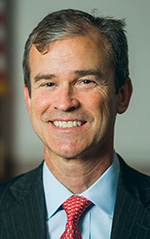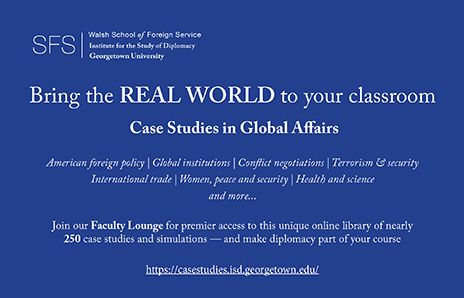Six Elements of Effective Economic/Commercial Diplomacy
Secretary of State Mike Pompeo has made commercial diplomacy a foreign policy priority. Here’s how to get it right.
BY SHAUN DONNELLY AND DANIEL CROCKER
Economic security is national security, and national security is economic security. This statement might have aroused some eye-rolling from State Department “old boys” around Foggy Bottom, on Capitol Hill and around the Washington elite cocktail circuit of the 1950s and 1960s. But, as in so many other areas, the worlds of economic and commercial diplomacy have been increasingly mainstreamed into today’s policies and strategies for national security in the United States and around the world.
China’s ambitious Belt and Road strategy, with its use of aggressive financing and promotion of Chinese companies and labor to further its geopolitical aims, underscores the challenge that the U.S. government—and U.S. commercial interests—face throughout the world. Trade promotion, smashing foreign market access barriers and helping U.S. exporters and investors win competitive deals are front-page issues these days and can win State and Commerce Department officers recognition and promotions.
Presidents, national security advisors and Cabinet secretaries of both parties over the past two or three decades have come to see this new importance of commerce and economics in broader U.S. foreign policy. Most observers also acknowledge the need for the U.S. government to step up its efforts in economic/commercial diplomacy.
Three fundamental realities underline the importance for our country of an effective economic/commercial diplomacy program. First, more than 80 percent of global purchasing power now lies outside the United States, including several large emerging markets with annual gross domestic product (GDP) growth rates that are double our own, or more. Second, it’s an ultra-competitive world; in all key sectors, American companies face broader, deeper and more aggressive foreign competitors, some of whom promote their standards, military platforms and state-subsidized or state-owned companies for both commercial and political gain.
We’re not just competing with Europe, Canada and Japan these days; China, India, Korea, Brazil, Mexico and Singapore, among others, now have world-class firms with aggressive support from their governments. And third, like it or not, we are in a new world of globalization, supply chains, data flows and blockchains.
Yesterday’s companies and yesterday’s strategies will not prevail. We can, as some American political leaders are wont to do, opt to complain, invoke protectionist barriers and cry foul; but just playing defense and trying to deny new realities is not a winning strategy. With more than 80 percent of America’s labor force working in a disintermediated service sector and a rapid increase in automation in manufacturing, erecting barriers in response to goods trade imbalances risks ignoring future sources of American commercial competitiveness and job growth.
We see six critical elements in an effective U.S. economic/commercial diplomacy program.
1. International commerce and economics must be top priorities. The U.S. government can’t compete and win on the cheap; we can’t just mail it in. Recent passage of the BUILD Act, which wraps the Overseas Private Investment Corporation into a newly created U.S. International Development Finance Corporation that will be able to further U.S. economic interests through strategic investments overseas, is a strong indication of bipartisan and administration support for an effective program. Across the political spectrum, U.S. lawmakers are recognizing the competitive threat to our national interests posed by what appears, at first glance, to be simple promotion of Chinese commercial interests in countries as disparate as Montenegro, Sri Lanka and Nicaragua. However, though the U.S. government’s expertise is deep, it is also fragmented. Short of a dramatic restructuring of federal agencies, we owe it to U.S. taxpayers to coordinate efforts better—not only across federal agencies but also with state and local governments.
Within the federal government, State and Commerce will certainly need to play a leading role. As foreign affairs agencies with a global footprint and diplomatic accreditation, they are uniquely poised to be the field-forward force for economic/commercial diplomacy. Their career Foreign Service officers are on the front lines. But programs at the Department of Agriculture, the Export-Import Bank and the Trade and Development Agency also need to be incorporated and aggressively funded. Worryingly, the Export-Import Bank is now in limbo because of congressional inaction, putting several important U.S. exporters at a competitive disadvantage. An effective economic/commercial diplomacy program is a great investment and will pay for itself, but it does require sustained appropriations, good coordination and strong leadership.
More than 80 percent of global purchasing power now lies outside the United States, including several large emerging markets with annual GDP growth rates that are double our own.
2. Top leaders must be personally involved. Cabinet members, the vice president and the president need to consistently engage foreign counterparts to push U.S. competitors in major deals around the world. Cabinet and sub-cabinet officials must be available to lead trade missions and economic dialogues. And in the field, ambassadors must be personally engaged. If a chief of mission opts to delegate economic/commercial diplomacy to staff, it sends a clear message to senior foreign decision-makers.
Ambassadors need not be economic experts; they simply need to be forceful, effective diplomats. U.S. ambassadors such as Stu Eizenstat, Jon Huntsman, Charles Ford and Tony Wayne, who had strong economic and business backgrounds, have been very effective. But so were legendary diplomats like Tom Pickering, Frank Wisner, Kristie Kenney and Marc Grossman, who had little hands-on experience in the economic area. They are just great diplomats. Effective economic/commercial diplomacy is more about leadership, diplomacy and hard work than it is about economic policy or commercial contract details. Understanding the growing strategic importance of U.S. commercial wins in certain areas (e.g., new LNG ports and regasification infrastructure) should make it easier for U.S. ambassadors to take the lead in the field.
3. The Commerce and State Department partnership is critical. Frankly, over the years there has been some counterproductive rivalry between the State and Commerce Departments, and between individuals at various levels in Washington, D.C., and at posts around the world. Such rivalry—sometimes personal, sometimes over whether an individual issue or event is “economic” (i.e., State-led) or “commercial” (i.e., Commerce-led)—is not totally surprising. After all, President Franklin D. Roosevelt gave the State Department full responsibility for international economic/commercial diplomacy in 1939. But based in large part on a perception that State had not consistently and effectively led commercial issues and support for U.S. business, the 1980 Foreign Service Act pulled that responsibility out of State, transferred it to Commerce and established the Foreign Commercial Service.
The divorce was painful, especially at State, and left scars, most of which have, fortunately, faded with time. But we can no longer afford to let bureaucratic rivalries, personal egos or arcane debates about whether particular issues are “economic” or “commercial” get in the way. Any U.S. ambassador should expect—and both State and Commerce officers should deliver— a coordinated position on issues of commercial importance.
We see some very encouraging signs of Commerce/State cooperation. In 76 countries representing 90 percent of U.S. export markets FCS and State economic officers are collaborating closely to tackle market barriers and unfair trade practices, and protect U.S. investment interests. It is especially encouraging to see numerous examples of Commerce/State cooperation overseas on emerging issues such as digital trade, standards and regulations, intellectual property rights, financing infrastructure and combating corruption. In the past, such issues might have been fertile ground for bureaucratic rivalry. In another 60 countries where there are no FCS officers, a formal Partner Post program gives State economic officers full responsibility for all commercial and business support work, in coordination with Commerce’s domestic network of 106 U.S. Export Assistance Centers and nearby FCS posts. Further, State has opened its innovative Business Facilitation Incentive Fund, a program that offers incentives for State/Commerce cooperation in the field in the form of small grants to posts to fund creative initiatives in support of U.S. exporters.
A very promising recent initiative is State/Commerce cooperation on the annual Benjamin Joy Award. As President George Washington’s first American consul and commercial agent in India, the award’s namesake, Benjamin Joy, was an early exemplar of U.S. commercial and economic diplomacy. Commerce and State have jointly established and funded the competitive award, fully sharing the nomination, selection and ceremonial functions. The first two annual winners—teams of FSOs from State and Commerce, as well as Locally Employed staff, at Embassy Addis Ababa and Embassy Vientiane—have been inspiring examples of cooperation to directly benefit U.S. business, especially small and medium-sized businesses.
Another great example of Commerce/State cooperation is the annual “SelectUSA” Investment Summit, designed to attract inward foreign direct investment (FDI) into the United States, bringing technology, capital and good jobs to local communities around America. Commerce Secretary Wilbur Ross, like his predecessors, hosted the fifth summit of this Commerce-led program, which has contributed to $44 billion in investment into the country over the last six years. State has pitched in fully in recent years to promote the event, help Commerce strategize on foreign business and government leaders to invite, and fund participation of U.S. ambassadors in key markets to personally escort select foreign delegations. And like Secretary John Kerry before him, Secretary of State Mike Pompeo was an enthusiastic and supportive speaker at this year’s summit.
Of course, a bread-and-butter element of any effective commercial/economic diplomacy is high-level advocacy—both project advocacy and, increasingly, policy advocacy. Here again, interagency cooperation is critical, both in the field and in Washington. Commerce’s Advocacy Center has continued to grow in reach, effectiveness and interagency participation. State and U.S. embassies overseas are vital partners. The interagency team moves quickly to review potential advocacy cases, then sort out and implement a coordinated, often escalating, plan of letters, phone calls and travel by senior Commerce, State or other sub-cabinet officials, Cabinet members, the ambassador and/or the vice president and president. This high-level personal advocacy is delivering results: In Fiscal Year 2017, the Advocacy Center confirmed $42 billion in wins for U.S. companies, supporting hundreds of thousands of American jobs.
As American companies compete to grow, prosper and win, they will need support from the government across a much wider agenda.
4. But it’s not just a State/Commerce effort. It’s not enough for just State and Commerce to be all-in on economic/commercial diplomacy. America and American business need a well-coordinated, all-of-government effort. For agricultural sales, investment and technical issues, the Department of Agriculture needs to take the lead; and they do. Similarly, senior Treasury Department officials are integral when American banking, insurance and financial services companies need support. When foreign governments are pursuing defense products and services, senior Department of Defense and military officials, combatant commanders and resident defense attachés play a vital role. As noted above, on infrastructure and other capital-intensive projects, agencies like the U.S. Agency for International Development, the Millennium Challenge Corporation, the Export-Import Bank, TDA and the newly created U.S. International Development Finance Corporation can play important roles.
At posts overseas, sometimes the key information an American potential exporter or investor needs at a critical moment may best come from the embassy labor attaché, the regional security officer or a political or administrative officer. Political officers weigh in on cases moving through the local courts, and Department of Homeland Security officials have a role in foreign customs and ports contracts. They have the local contacts, expertise and insights that help U.S. companies win on a level and transparent playing field.
The basic point is that the entire embassy staff needs to be on the economic/commercial team for U.S. business. As noted above, hands-on ambassadorial leadership can be the key to effective embassy support for American business. At post, members of the ambassador’s country team need to check their agency equities at the door and deliver a coordinated strategy that serves U.S. national interests.
5. Don’t forget the states and cities. Often, especially in the effort to attract FDI into the United States, partnerships with U.S. states and cities are critical in winning a deal. For potential investors, issues like the local workforce, infrastructure and taxes can be determining factors. And those are generally state and local responsibilities in our unique federal system. Here Commerce’s SelectUSA team can play a vital coordinating role, and is increasingly providing data-driven analysis of such factors for every post that is promoting inward investment.
6. American business has a broad agenda in today’s and tomorrow’s global economy. While export of goods, old-fashioned manufactured goods, is in some ways the easiest sort of business to address, the U.S. government needs to recognize the realities of today’s global economy. As American companies compete to grow, prosper and win, they will need support from the government across a much wider agenda: services, regulatory coherence, license arrangements, international joint ventures, supply chain relationships, inward investment to the United States and outward investment by U.S companies to foreign markets. A truly supportive, comprehensive “Team USG” approach to support our companies will have to be able to address that full range of issues.
Consolidating, deepening and strengthening a U.S. government support program for our businesses led by Commerce and State is not easy. The issues are complicated and fast-changing; the competition is fierce and ever-intensifying. We’re optimistic that with strong Commerce and State Department leadership, the U.S. government is up to the task. But it will take an aggressive “all-hands, all-levels, all-agencies” approach.
Although it was completed more than a year ago, we would refer readers to a set of two reports on economic/commercial diplomacy, “Support for American Jobs,” from the American Academy of Diplomacy. These reports contain some detailed analysis and recommendations for effective action (full disclosure: one of this article’s authors is also co-author of those reports), and they suggest areas for work, including Commerce/State personnel exchanges, increased industry involvement in training of commercial and economic officers, and targeted trade missions. But the central point is that while more can, and will, remain to be done, America is well-positioned to compete and win in today’s global economy. And strong U.S. government support for our businesses and workers must be a bedrock element of our national economic security strategy.
A FOREIGN POLICY PRIORITY
UNCLASSIFIED
Date: Nov 07, 2018
From: SECSTATE WASHDC
Action: ALL DIPLOMATIC AND CONSULAR POSTS COLLECTIVE
Subject: Boosting Commercial Diplomacy around the World
1. Summary: The purpose of this message, written in collaboration with the Commerce Department, is to strengthen our collective work in commercial diplomacy by clarifying the roles, initiatives, and tools of the State and Commerce Departments in advancing American business interests overseas. … State and Commerce collaboration is key to U.S. company success overseas and to supporting jobs here at home. There is so much that we do – and can expand on – together, and we hope this cable helps strengthen our ability as a country to support U.S. business interests. End summary.
2. Secretary Pompeo has made helping American companies a foreign policy priority. Commercial diplomacy helps create jobs and prosperity at home and advances the economic prosperity goals in the President’s National Security Strategy. Promoting broad-based, responsible, and sustainable economic growth helps to stabilize regions and creates new and growing markets for U.S. companies. A transparent and level playing field for U.S. investment in these countries counters real and growing challenges such as China’s Belt and Road initiative.
3. We ask that you engage proactively not only at the transactional, but also at the transformational level. Doing so will advance key foreign policy goals, such as a stable and prosperous Indo-Pacific region, our priorities at the Summit of the Americas, Iraqi reconstruction, our commercial and security interests in Europe, and prosperity and stability in Africa. In advancing commercial interests, we also advance broader economic priorities, such as fighting corruption, pursuing greater aviation options for U.S. consumers, and supporting conflictfree diamonds. Every office in EB and many offices throughout the Department contribute to our commercial diplomacy. …
–Excerpted from the U.S. State Department cable
18 STATE 112364, E.O. 13526.






